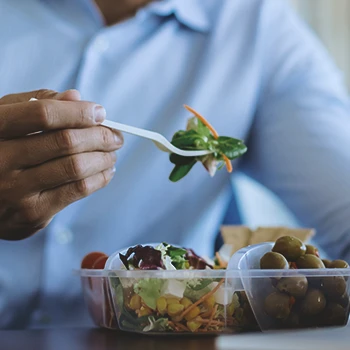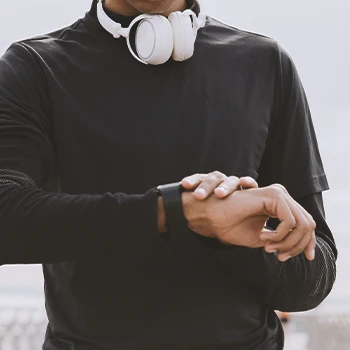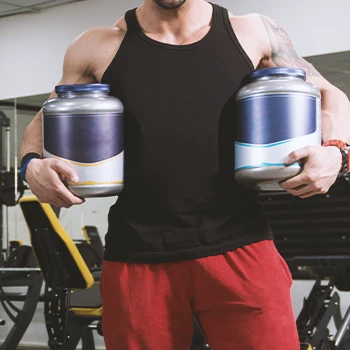In my experience as a fitness trainer for over a decade, many people tend to neglect the importance of eating before exercise. Whether it’s weight loss or muscle growth, optimal pre-workout nutrition plays a major role in workout performance.
To better explain the facts, I spent a few weeks reviewing scientific literature with the help of a dietician, as well as testing out what proved to be most effective for my clients.
Here’s what we found.
Quick Summary
- Eating a pre-workout meal can improve athletic performance, prevent injuries, and support muscle recovery.
- Consuming the right pre-workout meals, like orange smoothies or whole-grain bread with eggs, enhances workout performance and muscle recovery.
- A National Library of Medicine study found that whey protein ingestion boosts amino acid levels by about 50%, enhancing muscle synthesis and athletic performance.
- In my opinion, integrating a balanced pre-workout meal routine is beneficial for both fitness enthusiasts and professional athletes.
Why Should You Eat Before a Workout?

You should eat before a workout to fuel your body with enough calories and nutrients to power through your exercises.
Beginners often ignore pre-workout nutrition because many tend to believe that the extra calories might work against them. However, this is far from true.
A systematic review in MDPI found that exercising in a fasted state versus a fed state showed trivial to small effect sizes on body mass, with intra-group effect sizes ranging from 0.01 to −0.12, indicating minimal difference in weight loss outcomes [1].
Regardless of your exercise routine and fitness goals, pre-workout foods might have more benefits than working out on an empty stomach or in a fasted state.
3 Benefits

I've seen clients transform their workouts just by tweaking their pre-meal routines. It's not just about energy; it's about recovery and hitting those fitness milestones.
Here are some of the most important ones that’ll tie into your workout, recovery, and fitness results.
1. Heightened Athletic Performance
Eating the right foods before a workout may heighten your athletic performance and increase your exercise capacity.
For example, consuming complex carbohydrates before a workout can fuel your body with the energy it needs to perform well [2].
A study in the National Library of Medicine revealed that arterial amino acid concentrations increased by approximately 50% following whey protein ingestion, either before or after exercise, enhancing muscle-protein synthesis and potentially improving athletic performance [3].
Better workout performance allows you to achieve your fitness goals faster.
“Filling up your glycogen stores (body’s energy tank) before a workout can help improve your energy levels significantly during a workout.”
- Marc Perry, CSCS, CPT, Certified Trainer
2. Better Muscle Recovery
I remember a client who often skipped pre-workout meals and complained about muscle fatigue. Once we introduced a balanced meal before workouts, his recovery improved dramatically.
Inadequate recovery after your workout can lead to quicker muscle fatigue during your following workout. Muscle injury, more specifically muscle strain, has been linked to muscle fatigue [4].
Evidence suggests high-performance athletes need to consume a high-carb diet before working out to maintain muscle glycogen stores, which helps them stimulate muscle repair and growth [5].
3. May Prevent Injury
While these meals don’t prevent injury like safety equipment, they can indirectly keep you from unnecessary injuries that can hinder your progress significantly. Here’s how.
I've always noticed a clear difference in my focus and energy when I've fueled up properly before hitting the gym.
Better focus, as well as mental and physical energy, allow you to concentrate on your exercise form. This can reduce your chances of making a faulty move and injuring yourself.
When Should You Eat?

You should eat a pre-workout meal three hours to 30 minutes before your workout.
The timing of your pre-workout meal depends primarily on the digestibility of the food and serving size.
Fats are the slowest-digesting macronutrients, followed by lean protein, with carbohydrates usually the quickest [6].
So, if you’re going to eat a meal high in fats and protein, it’s better to keep a longer gap before your workout.
Carbs, on the other hand, don’t require as much of a gap. I've found that a banana or a slice of toast half an hour before a workout gives me just the right energy boost without feeling heavy.
“If you have a longer workout and/or more intense sweat session planned, you will likely need more pre-exercise fuel... I recommend choosing simple carbohydrates, which are faster forms of fuel and much easier for your body to access during exercise compared to fats or proteins. These take longer to digest and utilize, which can also cause some gut discomfort.”
- Dr. Tamanna Singh, MD, Clinical Cardiologist
Serving size also plays a role when eating before or after a workout. Eating a larger serving size means there’s more food that your body needs to digest. So, the more you eat, the longer you need to wait before working.
What’s worked best in my experience is waiting three hours if the meal is filling. The less filling your meal is, the less you need to wait before exercising.
5 Best Pre-Workout Meals

Based on our research and what worked best for our clients, we’ve compiled a list of the best pre-workout meals based on your fitness goals.
1. For Weight Loss
If your goal is to burn fat and lose weight fast, you want to focus on low-calorie meals that are rich in protein.
Here are some excellent pre-workout foods for weight loss. Many of them are keto-friendly:
- Rice cakes with almond butter
- BLT avocado
- Chicken salad with tzatziki Greek yogurt
- Turkey avocado wrap
- Orange smoothie
2. For Bodybuilding
If your goal is to build muscle mass and improve strength, then you’ll want to focus on a pre-workout meal that’s rich in protein and creatine:
- Broccoli and cheese omelet
- Coconut and Almond mocha smoothie
- Peanut butter and whey protein powder shake
- Whole-grain bread with eggs and low-fat turkey
3. For an Energy Boost
If you want to get into your workout with high energy levels, you'll want to avoid slow-digesting foods. Rather you should focus on complex carbohydrates that'll fuel your workout.
Here are some great choices:
- Peanut butter, banana, and chia seeds on whole grain bread
- Nut butter balls and protein bar
- Avocado on toast with hard-boiled egg before a workout
- Yogurt with berries, granola, and nut butter
- Chicken with brown rice and veggies
"A well balanced meal with protein, carbs, and fibre can keep you feeling full and energized but should be consumed at least 2 hours before a workout."
- Claire Muszalski, Registered Dietitian
4. For Women
Women have unique health concerns and typically don't burn as many calories as men. More often than not, they don't share the same workout goals.
Good pre-workout meals for women are sources that are low-calorie and energy-dense.
Here are some excellent options:
- Sweet potato as a pre-workout snack
- Oatmeal with honey
- Whole fruits
- Greek yogurt
- Low-calorie fruit smoothies or protein shakes (made with almond or low-fat milk)
5. What About Supplements?

Pre-Workout Supplements are an excellent option if you’re running short on time and need a quick energy boost right before a workout.
I found they are a quick way to energize before hitting the gym.
We highly recommend taking natural pre-workout alternatives.
A good quality pre-workout really benefits your workout routine by boosting your energy levels, improving post-workout recovery, and enhancing your exercise performance.
Key Supplements and Their Benefits
Here's which supplements you should take:
- Creatine: One of the most researched supplements, creatine can improve strength, increase lean muscle mass, and help muscles recover more quickly during exercise. It's particularly effective in high-intensity training and explosive activities.
- Beta-alanine: This amino acid can help improve exercise capacity and lessen muscle fatigue. It's particularly beneficial during short bursts of intense exercise.
- Caffeine: A well-known stimulant, caffeine can improve mental alertness, energy, and endurance. It can also reduce the perception of effort, making your workout feel less intense.
- Branched-chain amino acids (BCAAs): BCAAs can promote muscle protein synthesis and increase muscle growth over time. They may also help with muscle recovery and reduce soreness after workouts.
Role of Hydration in Pre-Workout Preparation
Staying hydrated has been a game-changer for me. I start drinking water a couple of hours before my workout and it really boosts my performance.
Here are hydration guidelines for pre-workout:
- Timing: Begin hydrating at least two hours before your workout. This allows your body to absorb the fluid and reach a state of optimal hydration before you start exercising.
- Amount: A general guideline is to drink about 17-20 ounces of water 2-3 hours before exercise, and an additional 8 ounces 20-30 minutes before starting your workout.
- Monitoring hydration: Pay attention to the color of your urine. A pale yellow color is a good indicator of proper hydration. Also, weigh yourself before and after workouts to monitor water loss and understand your hydration needs.
- Electrolytes: For intense or longer-duration workouts, consider beverages that contain electrolytes. Electrolytes, like sodium and potassium, help maintain fluid balance and muscle function.
FAQs
Is It Okay to Work Out on an Empty Stomach?
Yes, it’s okay to work out on an empty stomach as long as you’re not hungry to the point of distraction or doing a long, challenging workout.
Why Shouldn’t I Eat Pre-Workout Meals Immediately Before Exercising?
You shouldn’t eat pre-workout meals immediately before exercising because it may cause discomfort and stall your digestion. When you exercise right after a meal, there’s more blood going to your muscles, leaving less to assist your digestion.
What Should I Not Eat Before a Workout?
You should not eat anything that is extremely filling, like lasagna, fried chicken, or large salads, before a workout. These foods can leave you feeling weighed down and exhausted before you begin exercising.
Are Pre-Workout Meals Better Than Pre-Workout Supplements?
No, pre-workout meals are not necessarily better than pre-workout supplements, but it depends on your goals. While pre-workout meals give your body both energy and nutrition, they don’t boost your energy as significantly as supplements.
Are Pre-Workout Meals Better Than Pre-Workout Supplements?
No, pre-workout meals are not necessarily better than pre-workout supplements, but it depends on your goals. While pre-workout meals give your body both energy and nutrition, they don’t boost your energy as significantly as supplements.
Can I Have a Sports Drink Before My Workout?
Yes, you can have a sports drink before your workout. However, many sports drinks are high in calories and artificial ingredients, so be careful about which one you choose.
References:
- https://www.mdpi.com/2411-5142/2/4/43
- https://www.medicalnewstoday.com/articles/322963#carbohydrates
- https://pubmed.ncbi.nlm.nih.gov/16896166/
- https://www.sciencedirect.com/science/article/abs/pii/S1047965118301359
- https://www.ncbi.nlm.nih.gov/pmc/articles/PMC6019055/
- https://www.weekand.com/healthy-living/article/digests-first-protein-carbohydrates-fat-18008218.php
About The Author
You May Also Like






